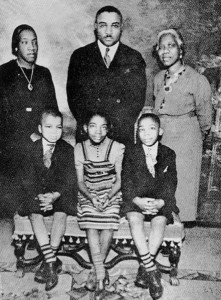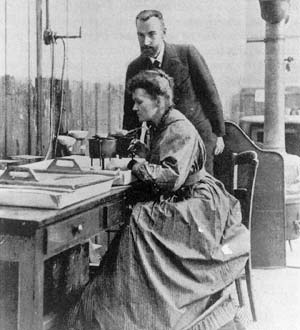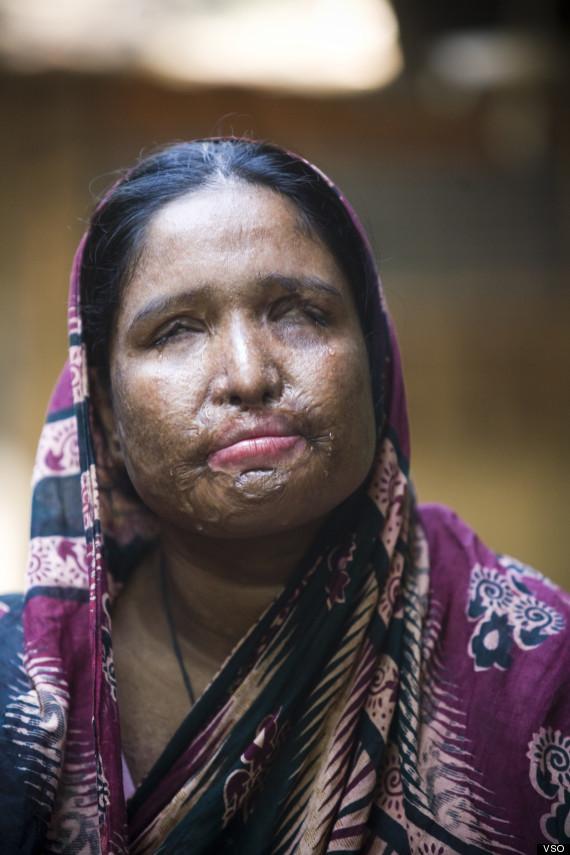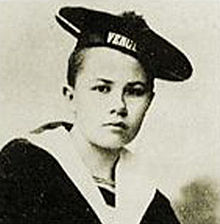

The Rev. Martin Luther King, Jr. said, “It really boils down to this: that all life is interrelated. We are all caught in an inescapable network of mutuality, tired into a single garment of destiny. Whatever affects one destiny, affects all indirectly.”
It was King’s mother, Alberta Christine Williams whose family tree would influence her son’s destiny. Her father, the Rev. Albert Daniel Williams was the son of a slave preacher. It was his destiny to take over the troubled Ebenezer Baptist Church in Atlanta, with just 13 members and no permanent structure for services. It was her father who would inspire a congregation and fill up the pews. After his death, her husband, the Rev. Martin Luther King, Sr. would become Pastor, eventually succeeded by her son, Rev. Martin Luther King, Jr. While away at Crozer Theological Seminary, King wrote:
“Your letter was received this morning. I often tell the boys around the campus I have the best mother in the world.”
One of my favorite pieces of history comes from the King Papers Project. By all accounts, King, Jr. was a high achieving child, skipping several grades. With three children and a church to help run, I wonder if Alberta’s son was sometimes quite a handful. Her father died suddenly in 1931, and her husband, the Rev. Martin Luther King, Sr. became Pastor of Ebenezer Baptist Church. In 1934, King, Jr. and his older sister were sent to school. Unfortunately, according to the King Papers Project:
“In 1934, King, Jr., reveals to his first-grade teacher that he is only five years old and is expelled from school.”
I love that depiction. The honest, precocious child, the sister who was perhaps sent to keep him out of trouble, the exhausted mother of three who just wanted a little break. Her influence was undeniable. King’s father was extremely active in moving the civil rights movement forward, protesting whites-only elevators at the Fulton County Courthouse, becoming President of the Atlanta Baptist Ministers Union, and working with black voters on procedures.
In a excerpt for King’s autobiography edited by Clayborne Carson, King writes:
My mother, Alberta Williams King, has been behind the scene setting forth those motherly cares, the lack of which leaves a missing link in life. Unlike my father, she is soft-spoken and easygoing. She instilled a sense of self-respect in all of her children from the very beginning.
My mother confronted the age-old problem of the Negro parent in America: how to explain discrimination and segregation to a small child. She taught me that I should feel a sense of “somebodiness” but that on the other hand I had to go out and face a system that stared me in the face every day saying you are “less than,” you are “not equal to.” She made it clear that she opposed this system and that I must never allow it to make me feel inferior. Then she said the words that almost every Negro hears before he can yet understand the injustice that makes them necessary: “You are as good as anyone.”
She worried about her son, as did her husband. On April 4, 1968, Dr. Martin Luther King, Jr., was shot and killed as he stood on the balcony at the Lorraine Motel in Memphis. Six years later, on June 30, 1974, Alberta Christine Williams King, the beloved mother of the Rev. Martin Luther King, Jr., was enjoying the newly installed organ at Ebenezer Baptist Church, playing “The Lord’s Prayer,” when she was shot and killed during morning services. According to Time magazine:
No one paid much attention when a short, chunky black man wearing a tan suit and thick glasses slipped into a seat a few feet from the organ.
Mrs. Martin Luther King Sr., 69, wife of the pastor and mother of the slain civil rights leader, was playing. As the 500 worshipers bowed their heads for the Lord’s Prayer, Marcus Wayne Chenault, 23, opened fire with two revolvers.
“I’m tired of all this!” he screamed.
The NY Times wrote:
“At his arraignment, Mr. Chenault told a magistrate that he had come to Atlanta “on a mission,” and said he decided months earlier that black ministers were a menace to black people and must be killed.”
While her death is a tragic end to a life that sacrificed so much, I can’t help but feel that at least she died singing the Lord’s praises, surrounded by friends and family in the church she grew up in, was married in and where she raised a young man that would go on to change the world.
by John Lewis (Author) , Andrew Aydin (Author) , Nate Powell (Author)




